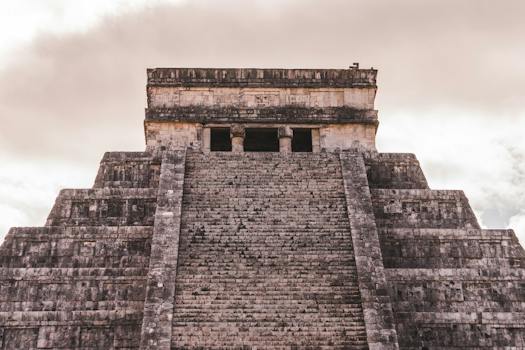

-
Table of Contents
Unveiling the Truth: Challenging Preconceptions of Pre-Columbian Americas
Introduction
Debunking the Myth of Pristine Americas: William Denevan’s Critique of Pre-Columbian History
In the field of pre-Columbian history, there has long been a prevailing myth that the Americas were pristine and untouched by human activity prior to the arrival of Christopher Columbus in 1492. However, this myth has been challenged by the work of William Denevan, an influential geographer and historian. Denevan's critique of pre-Columbian history has shed light on the extensive human impact on the American landscape before European contact, challenging the notion of a pristine Americas. This introduction will explore Denevan's arguments and their implications for our understanding of the history and ecology of the Americas.
The Impact of Human Activity on Pre-Columbian Americas
The history of the Americas before the arrival of Christopher Columbus has long been shrouded in mystery and myth. For centuries, it was believed that the Americas were a pristine wilderness, untouched by human activity. However, the work of historian William Denevan has challenged this notion, arguing that the impact of human activity on pre-Columbian Americas was far greater than previously thought.
Denevan's critique of pre-Columbian history is based on extensive research and analysis of archaeological evidence. He argues that the Americas were not a pristine wilderness, but rather a landscape shaped by human activity for thousands of years. Denevan points to the presence of ancient agricultural systems, such as terracing and irrigation, as evidence of human impact on the land.
One of the key aspects of Denevan's critique is his examination of the population of pre-Columbian Americas. Contrary to popular belief, Denevan argues that the Americas were not sparsely populated, but rather home to millions of people. He points to the existence of large cities, such as Cahokia in present-day Illinois, as evidence of a thriving civilization.
Denevan also challenges the notion that the Americas were a pristine wilderness by examining the impact of human activity on the environment. He argues that pre-Columbian societies engaged in extensive deforestation, clearing large areas of land for agriculture. This deforestation had a significant impact on the environment, leading to soil erosion and the loss of biodiversity.
Furthermore, Denevan argues that pre-Columbian societies also engaged in large-scale burning of the land. This practice, known as slash-and-burn agriculture, was used to clear land for cultivation. However, it also had unintended consequences, such as the release of large amounts of carbon dioxide into the atmosphere.
Denevan's critique of pre-Columbian history has important implications for our understanding of the Americas before Columbus. It challenges the notion of a pristine wilderness and highlights the significant impact of human activity on the land. This has important implications for our understanding of environmental history and the long-term effects of human activity on the planet.
In conclusion, William Denevan's critique of pre-Columbian history has debunked the myth of pristine Americas. Through his extensive research and analysis, Denevan has shown that the Americas were not a pristine wilderness, but rather a landscape shaped by human activity. His examination of ancient agricultural systems, population levels, and environmental impact has challenged long-held beliefs and provided a new perspective on pre-Columbian Americas. This has important implications for our understanding of history and the long-term effects of human activity on the environment.
Reevaluating the Notion of Pristine Environments in Pre-Columbian Americas

Debunking the Myth of Pristine Americas: William Denevan’s Critique of Pre-Columbian History
Reevaluating the Notion of Pristine Environments in Pre-Columbian Americas
When we think of the Americas before the arrival of Christopher Columbus, we often imagine pristine landscapes untouched by human activity. This notion of a pristine environment, however, has been challenged by the work of William Denevan, a geographer and historian who has dedicated his career to reevaluating pre-Columbian history. In his groundbreaking research, Denevan argues that the Americas were far from untouched wildernesses, but rather shaped by centuries of human habitation and land use.
Denevan's critique begins by questioning the widely held belief that Native Americans had a minimal impact on the environment. He argues that this perspective is rooted in a Eurocentric worldview that fails to acknowledge the sophisticated land management practices employed by indigenous peoples. By studying historical records, archaeological evidence, and oral traditions, Denevan demonstrates that Native Americans actively shaped their environments through practices such as controlled burning, agriculture, and the creation of extensive trade networks.
One of the key examples Denevan uses to support his argument is the Amazon rainforest. Contrary to popular belief, he asserts that the Amazon was not an untouched wilderness, but rather a landscape that had been shaped by human activity for thousands of years. Through the use of fire, indigenous peoples transformed the forest into a mosaic of different ecosystems, creating fertile soils and promoting biodiversity. Denevan's research challenges the notion that the Amazon rainforest is a pristine environment, highlighting the long history of human influence on this iconic landscape.
Denevan's critique also extends to other regions of the Americas. He argues that the vast grasslands of the Great Plains were not solely the result of natural processes, but rather the product of intentional burning and hunting practices by Native American tribes. These practices not only shaped the landscape but also influenced the distribution and abundance of wildlife. Denevan's research challenges the idea that the Great Plains were a pristine wilderness, revealing the deep connection between Native Americans and their environment.
Furthermore, Denevan's work sheds light on the impact of European colonization on the Americas. He argues that the arrival of Europeans brought about significant environmental changes, including the introduction of new diseases, the displacement of indigenous populations, and the destruction of traditional land management practices. By comparing historical records and ecological data, Denevan demonstrates that the arrival of Europeans led to a decline in biodiversity and the transformation of once-thriving ecosystems.
In conclusion, William Denevan's critique of pre-Columbian history challenges the widely held belief in the pristine Americas. Through his research, Denevan highlights the active role of Native Americans in shaping their environments and dispels the myth of untouched wildernesses. His work not only reevaluates our understanding of pre-Columbian history but also emphasizes the importance of acknowledging indigenous knowledge and land management practices. By debunking the myth of pristine Americas, Denevan invites us to reconsider our relationship with the environment and recognize the long history of human influence on the landscapes we inhabit.
Challenging Assumptions: Rethinking Preconceived Ideas about Pre-Columbian Americas
Debunking the Myth of Pristine Americas: William Denevan’s Critique of Pre-Columbian History
Challenging Assumptions: Rethinking Preconceived Ideas about Pre-Columbian Americas
When we think of the Americas before the arrival of Christopher Columbus, we often envision a pristine land untouched by human hands. This image of an unspoiled wilderness, teeming with wildlife and untouched by civilization, has been ingrained in our collective consciousness. However, William Denevan, a prominent geographer and historian, challenges this assumption and offers a new perspective on the pre-Columbian Americas.
Denevan's critique of pre-Columbian history is based on extensive research and analysis of archaeological evidence, historical accounts, and ecological studies. He argues that the Americas were not as pristine as commonly believed, but rather shaped by human activity for thousands of years before Columbus set foot on its shores.
One of the key points Denevan makes is that Native Americans were not passive inhabitants of the land, but active agents of change. Contrary to the popular belief that they lived in harmony with nature, Denevan argues that Native Americans actively manipulated their environment through practices such as burning, clearing land for agriculture, and managing wildlife populations. These practices had a profound impact on the landscape, shaping it to suit their needs and creating a mosaic of different ecosystems.
Denevan also challenges the notion that the Americas were sparsely populated before Columbus. He argues that the indigenous population was much larger than previously estimated, with some regions supporting dense settlements and complex societies. Through his research, Denevan has uncovered evidence of extensive agricultural systems, sophisticated trade networks, and large-scale construction projects, all of which point to a thriving and populous pre-Columbian Americas.
Furthermore, Denevan's work sheds light on the devastating impact of European colonization on the indigenous populations. He argues that the arrival of Europeans brought about widespread disease, warfare, and forced labor, leading to a significant decline in the Native American population. This population collapse, often referred to as the "Great Dying," had a profound and lasting impact on the Americas, forever altering its ecological and cultural landscape.
Denevan's critique of pre-Columbian history challenges our preconceived ideas about the Americas and forces us to reconsider the narrative of a pristine and untouched land. His research highlights the agency and ingenuity of Native Americans, as well as the devastating consequences of European colonization. By debunking the myth of a pristine Americas, Denevan invites us to view the pre-Columbian period through a new lens, one that recognizes the complexity and richness of its history.
In conclusion, William Denevan's critique of pre-Columbian history offers a fresh perspective on the Americas before the arrival of Columbus. His research challenges the assumption of a pristine and untouched land, highlighting the active role of Native Americans in shaping their environment. Denevan also sheds light on the devastating impact of European colonization, which forever altered the ecological and cultural landscape of the Americas. By rethinking our preconceived ideas about the pre-Columbian Americas, we gain a deeper understanding of its history and the complex interactions between humans and their environment.
Q&A
1. What is the main argument of William Denevan's critique of Pre-Columbian history?
William Denevan argues that the idea of pristine, untouched Americas before European contact is a myth and that indigenous peoples had a significant impact on the environment through agriculture and land management practices.
2. What evidence does Denevan provide to support his argument?
Denevan provides evidence from archaeological studies, historical accounts, and ecological research that demonstrate the extensive human modification of the American landscape prior to European arrival.
3. What is the significance of Denevan's critique?
Denevan's critique challenges the traditional narrative of a pristine, untouched Americas, highlighting the agency and environmental impact of indigenous peoples. It emphasizes the need to recognize and respect indigenous knowledge and practices in understanding the history and ecology of the Americas.
Conclusion
In conclusion, William Denevan's critique of pre-Columbian history challenges the widely held belief in the pristine nature of the Americas before European contact. Through his research and analysis, Denevan debunks the myth of untouched landscapes and argues that indigenous peoples had a significant impact on the environment long before the arrival of Europeans. His work highlights the importance of considering indigenous agency and the complex interactions between humans and their environment in understanding the history of the Americas.











